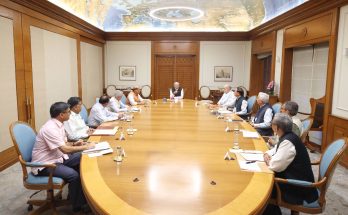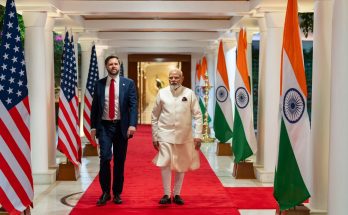
Transformational diplomacy has acquired a new salience and resonance in the multi-faceted India-UK relations after the May 8 digital summit between the leaders of the two countries. In their official versions of the summit, both India and the UK have underlined the transformational nature of the summit between Prime Minister Narendra Modi and his British counterpart Boris Johnson, which culminated in the launch of the all-encompassing ‘Roadmap 2030’ for accelerated transformation of India-UK relations.

The India-UK digital summit has ushered in a new kind of relationship in a new and different world, which will be marked by a dynamic connect between the two countries in areas such as trade and investment, climate change and innovation, said British High Commissioner Alex Ellis in a virtual media briefing.
“We need a new kind of relationship in a new and different world,” said the envoy while underlining the summit marks a far-reaching transformation in India-UK ties.
“The summit and the agreements have marked a transformation in the UK-India relationship,’ he said at a virtual media briefing.

The word transformational was used several times during discussions at the summit, said Sandeep Chakravorty, Joint Secretary (Europe West division) in India’s Ministry of External Affairs.
“In line with their vision to achieve a transformational change in bilateral cooperation, both leaders adopted an ambitious Roadmap 2030 to elevate India-UK partnership to a Comprehensive Strategic Partnership. The Roadmap will pave the way for a deeper and stronger engagement over the next ten years,” said Mr Chakravorty.
The Roadmap 2030 outlines an array of outcome-oriented activities and initiatives by the two sides in five keys areas: people to people contacts, trade and economy, defence and security, climate action and health. It’s not just a vision thing, but the two sides have resolved to walk the talk as the implementation of the roadmap will be closely monitored through annual strategic review meeting at the Foreign Minister level and the progress reported to the two Prime Ministers.
Underscoring the values complex that binds the two democracies, the British prime minister said at the summit: “The UK and India share many fundamental values. The UK is one of the oldest democracies, and India is the world’s largest. We are both committed members of the Commonwealth. And there is a living bridge uniting the people of our countries.”
The digital summit is set to further transform the robust economic partnership through the Declaration on Enhanced Trade Partnership, which envisages doubling of over $15 billion bilateral trade by 2030. The two-way trade between the world’s 5th and 6th largest economies in 2019-20 was USD 15.4 billion. Going forward, the two leaders announced their intent to negotiate a comprehensive and balanced FTA including consideration of an Interim Trade Agreement for delivering early gains.
The two sides have also agreed on an early market access package, which will enable the UK to open up the fisheries sector for more Indian players, facilitate more opportunities for nurses, recognise Indian seafarers’ certificates and also enter into a joint dialogue on the Social Security Agreement. In return, India has agreed to the UK’s demand for easing of tariffs on fruits, medical devices, and mutual recognition of masters degrees and also work towards reciprocal opening of legal services. These actions are likely to generate 20-25,000 new direct and indirect jobs in India.
The signing of the India-UK migration and mobility partnership is another major highlight of the transforming India-UK partnership. It provides for enhanced employment opportunities for around 3,000 Indian professionals annually, but it mandates New Delhi to take back the Indians who have been staying illegally in Britain.
The British high commissioner underlined that the provisions of the mobility agreement will be implemented under an efficient mechanism. He added that the UK wants its expeditious implementation but at the same time added that the process has to be carried forward ensuring that it is legally correct.
The summit also saw a deepening of strategic partnership between India and the UK, pivoted around the Indo-Pacific.
“They affirmed their shared vision of an open, free, inclusive and rules-based Indo-Pacific region, underpinned by respect for territorial integrity and sovereignty, rule of law, transparency, freedom of navigation and overflight in the international seas, unimpeded lawful commerce, and peaceful resolution of disputes,” said the joint statement.
In a response to a question from India Writes Network, the British high commissioner said: “The partnership in the Indo-Pacific will include several areas including trade, development cooperation and disaster mitigation.”
Author Profile

- Manish Chand is Founder-CEO and Editor-in-Chief of India Writes Network (www.indiawrites.org) and India and World, a pioneering magazine focused on international affairs. He is CEO/Director of TGII Media Private Limited, an India-based media, publishing, research and consultancy company.
Latest entries
 India and the WorldApril 21, 20253T Template for India-US Mega Partnership
India and the WorldApril 21, 20253T Template for India-US Mega Partnership India and the WorldFebruary 14, 2025Modi-Trump COMPACT: India, US launch MEGA partnership for 21st century
India and the WorldFebruary 14, 2025Modi-Trump COMPACT: India, US launch MEGA partnership for 21st century India and the WorldJanuary 28, 2025Modi, Trump talk global peace, focus on strategic connect
India and the WorldJanuary 28, 2025Modi, Trump talk global peace, focus on strategic connect India and the WorldDecember 16, 2024Kazan Spirit: India, China SRs to hold talks in Beijing
India and the WorldDecember 16, 2024Kazan Spirit: India, China SRs to hold talks in Beijing







